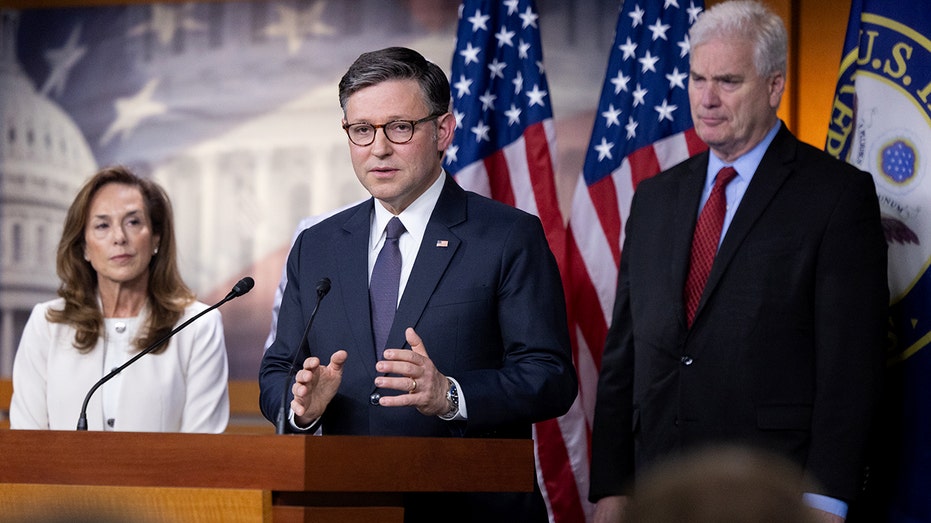In a heated political climate marked by internal struggles, House Republicans have recently found themselves embroiled in controversy over a bilingual social media post. This move has sparked outrage among various factions within the party, highlighting the deep-seated divisions and conflicting priorities that continue to characterize the GOP’s operations.
The bilingual post, which was intended to reach both English and Spanish-speaking constituents, was designed to convey a message of inclusivity and broaden the party’s appeal. However, it quickly became a flashpoint for criticism from members who view such efforts as either unnecessary or contradictory to the party’s traditional values.
In an era where the Republican Party is grappling with identity issues and the ongoing fallout from the previous administration, the response to this bilingual approach underscores the challenges lawmakers face as they try to unify the party and attract diverse voters.
Critics of the bilingual communication have emerged from all corners of the Republican Party. Some argue that the decision undermines the party’s efforts to maintain a consistent message and that resources should be focused elsewhere. According to them, catering to bilingual audiences could alienate core supporters who see such actions as aligning more with progressive ideologies than traditional Republican beliefs.
One prominent Republican representative took to social media to express disapproval, stating that, while outreach to different communities is important, the party should not forget its roots. “We must prioritize our base,” the representative said. “Trying to accommodate everyone might lead us to lose sight of what the party stands for.”
On the other side of the spectrum, proponents of the bilingual approach have defended the decision, asserting that inclusivity is crucial for the party’s long-term viability. In a rapidly changing demographic landscape, they argue that reaching out to Spanish-speaking voters could be a strategic move to garner support in key battleground states where Latino populations are growing.
In states like Arizona, Texas, and Nevada, the Hispanic electorate plays a pivotal role in elections, and supporters of the bilingual post emphasize that ignoring this demographic could be detrimental. They argue that the GOP must evolve if it wishes to remain relevant in the political arena.
Amid this tumult, Senate Republicans are also feeling the pressure as they try to navigate their strategy for the upcoming elections. Infighting is widespread, with various factions emerging within the party that prioritize different issues. Some focus on traditional conservative values, while others emphasize the need for modernization and outreach. This rift is becoming increasingly visible, as different Republican groups push their agenda, further complicating the party’s ability to present a unified front.
The tensions culminated in a recent closed-door meeting, where House leaders addressed the growing dissent among their ranks. During the session, members raised concerns about the party’s messaging and the implications of trying to appeal to a broader audience. The consensus revealed a split, with some members urging caution while others insisted on open dialogue and engagement with new demographic groups.
The party’s internal strife is also reflected in the ongoing debates regarding immigration policy, a subject that has historically divided Republican lawmakers. While some members advocate for a hardline stance, others suggest a more nuanced approach that includes pathways to citizenship for undocumented immigrants. This divergence has further fueled the frustration of party leaders who are striving to create coherence in the face of election-year pressures.
The fallout from the bilingual post and the surrounding controversy has attracted attention from political analysts, who warn of the implications of such divisions in the lead-up to critical elections. “The Republican Party is at a crossroads,” says political analyst Jane Doe. “They need to determine whether they will cling to their traditional base or adapt to the changing dynamics in their voter base. Failing to reconcile these differences could spell disaster.”
Furthermore, national polls indicate that voters are increasingly prioritizing issues like economic security, healthcare, and social justice. The GOP faces challenges in aligning its message with the evolving priorities of the electorate. As internal disagreements persist, the party’s leadership is urgently seeking ways to navigate their path forward.
As the GOP grapples with these issues, the bilingual post serves as a symbol of the broader challenges facing the party. The reaction it has provoked underscores the necessity for a thoughtful and strategic approach to messaging—one that recognizes the importance of adaptability in a rapidly changing political landscape.
The situation has also drawn responses from individuals outside the party, including former Republican officials and strategists who have observed the internal struggle from a distance. Many expressed their views that the party must either commit to positive change or risk losing further ground in critical elections. “If the GOP does not learn to speak to a broader audience, they will remain stuck in the past, watching as other parties seize the momentum,” remarked one former strategist.
This controversy over a bilingual statement is a reflection of larger debates within the Republican Party, and as the infighting intensifies, the pressure is mounting for leadership to establish a clear and unified direction. The party’s ability to balance differing viewpoints and unite its members around a common cause may ultimately determine its success in the near future.
In conclusion, the House Republicans’ bilingual post has triggered not only an immediate uproar but also highlighted the fissures within the party. As GOP lawmakers strive for relevance in an ever-evolving political landscape, they must work diligently to reconcile their internal differences in order to stay competitive. Whether they can successfully navigate these complex dynamics remains to be seen, but the eyes of the nation—and party insiders—are keenly watching their next steps.
As the dialogue around the bilingual issue continues, it is clear that the path to a unified Republican Party will not be without its challenges. Only time will reveal if the party can evolve while maintaining its foundational principles, or if it becomes further entrenched in the various ideological battles wracking its ranks.
































